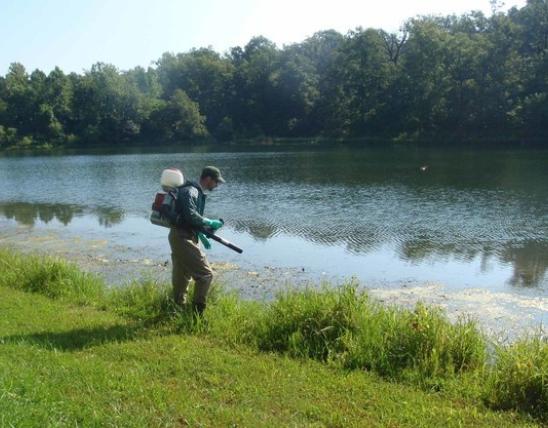Mosses, Liverworts, and Lichens
Media
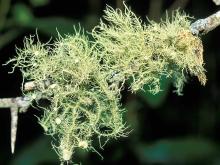
Species Types
Scientific Name
Usnea spp.
Description
Beard lichens are shrubby, branching, hairy-looking lichens that grow in tufts from a single point on tree branches. They are grayish green, and the branches are round in cross-section.
Media
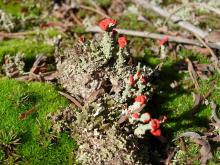
Species Types
Scientific Name
Cladonia cristatella
Description
British soldier lichen is widespread in eastern North America. Branching stalks with bright red knobs at their tips arise from a patch of small, green scalelike structures. The red is similar to the color of British soldiers’ coats during the American Revolution.
Media
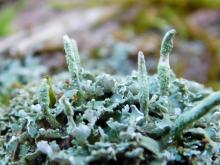
Species Types
Scientific Name
Cladonia coniocraea
Description
Common powderhorn’s slender, gray-green, hornlike fruiting structures emerge from a carpet of gray-green, scalelike squamules. This lichen usually grows on old, damp wood, often on tree bases, in shady areas.
Media
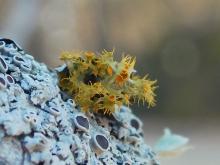
Species Types
Scientific Name
Teloschistes chrysopthalmus
Description
Gold-eye lichen is quite small but easy to identify. It grows on twigs and small branches. It is shrubby with yellowish branching stalks. The apothecia disks are bright orange and have spiny-looking appendages around the rim.
Media
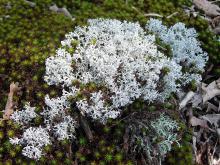
Species Types
Scientific Name
Cladina rangiferina (syn. Cladonia rangiferina)
Description
Gray reindeer lichen, also called reindeer moss, takes the form of bright ashy or silvery-gray, branching cushions that grow on the soil. The branch tips usually bend to point in the same direction, as if combed or blown by a strong wind.
Media
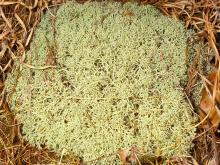
Species Types
Scientific Name
Cladina subtenuis (syn. Cladonia subtenuis)
Description
Dixie reindeer lichen, also called reindeer moss, takes the form of pale yellow-green, finely branched cushions that grow on the soil. This is the most common and widespread of Missouri’s reindeer lichen species.
Media
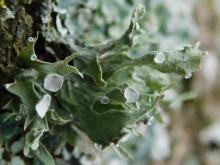
Species Types
Scientific Name
Ramalina spp.
Description
Twig lichens, or ramalina lichens, are branching, shrubby lichens that grow in tufts from a single point. They are grayish green, and the branches are distinctively flattened.
Media

Species Types
Scientific Name
Riccia fluitans
Description
Floating crystalwort, or slender riccia, is a type of liverwort that floats in lakes, ponds, and streams, forming dense, tangled mats in shallow water. It’s also used as an aquarium plant.
Media

Species Types
Scientific Name
Parmotrema spp.
Description
Ruffle lichens are rather large, broad-lobed foliose lichens that are loosely attached to the substrate. The rounded edges of the lobes usually lift up and look ruffled. Hairlike cilia arise from the lobe edges. They usually grow on tree bark.
Media

Species Types
Scientific Name
Dermatocarpon spp.
Description
Stippleback lichens, or rock tripes, are almost always found on bluffs, boulders, and outcrops. They cling to their substrate by a single point of attachment and typically grow in clusters. The surface of these floppy-looking lichens is covered with tiny black dots.
See Also
About Mosses, Liverworts, and Lichens in Missouri
Mosses, liverworts, hornworts, and lichens seem rather similar, but these organisms are in very different groups. Mosses, liverworts, and hornworts are small, low plants usually found in damp habitats. Unlike more familiar plants, they lack veinlike structures and do not produce flowers or seeds — instead, they produce spores. Meanwhile, lichens are not plants at all: they are a collection of different fungi that have photosynthetic algae living within their tissues.














